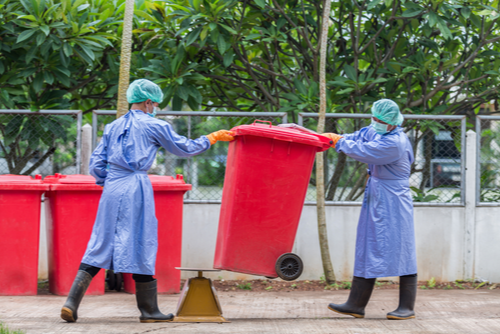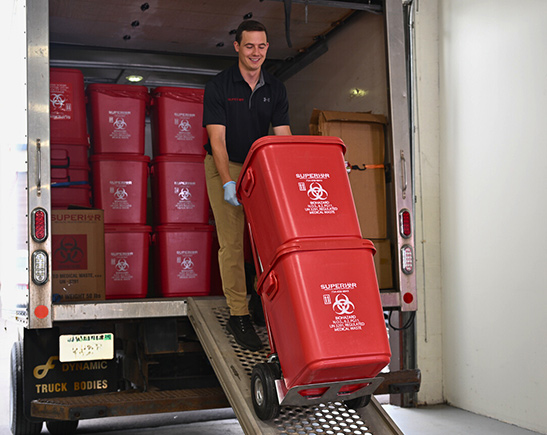Past Clean-up: Ensuring Safety And Security with Specialist Medical Waste Removal
Past Clean-up: Ensuring Safety And Security with Specialist Medical Waste Removal
Blog Article
The Value of Proper Clinical Garbage Disposal: An Overview for Medical Care Facilities
Proper clinical waste disposal is an important element of health care facility monitoring, making certain the security and well-being of individuals, team, and the atmosphere. From understanding the different categories of medical waste to complying with regulatory requirements, health care facilities need to take on effective waste partition techniques and select proper disposal approaches.
Recognizing Clinical Waste Categories
Understanding clinical waste categories is crucial for proper disposal in health care facilities. Medical waste is a broad term that encompasses various kinds of waste produced in healthcare settings, such as laboratories, facilities, and medical facilities. Classifying clinical waste assists guarantee that it is taken care of, kept, and disposed of safely and according to suitable regulations.
There are numerous classifications of medical waste that health care centers need to be knowledgeable about. These categories include contagious waste, sharps waste, pharmaceutical waste, chemical waste, and radioactive waste (medical waste disposal services with WasteX). Each group has specific features and calls for various disposal approaches to lessen the risk of injury to healthcare workers, patients, and the environment
Infectious waste, for instance, refers to waste polluted with possibly contagious materials, such as blood, body liquids, and cells. Sharps waste includes needles, syringes, and other sharp objects that can cause injury or transfer infections. Pharmaceutical waste contains run out or extra medications, while chemical waste consists of harmful chemicals utilized in clinical procedures. Contaminated waste consists of products contaminated with radioactive compounds, such as nuclear medication products.
Conformity With Regulatory Demands
Medical care facilities have to make sure compliance with governing demands for proper medical waste disposal. Regulatory bodies, such as the Environmental Security Company (EPA) and the Occupational Safety And Security and Health And Wellness Management (OSHA), have established guidelines and policies to safeguard public health and wellness and the setting. These laws describe the proper handling, storage, transport, and disposal of clinical waste.
Compliance with regulatory demands is essential for healthcare centers to stay clear of lawful charges, reputational damage, and prospective harm to human health and wellness and the setting. Failing to follow these guidelines can cause fines, claims, and also the suspension or retraction of operating licenses.
To guarantee compliance, healthcare centers must establish detailed waste management programs that include team training, appropriate waste segregation, and the usage of suitable containers and tags. Routine audits and examinations need to additionally be carried out to determine any kind of non-compliance problems and address them without delay.
It is vital for health care centers to stay up to day with modifications in policies and update their waste management practices as necessary. This can be achieved by actively keeping an eye on updates from regulative bodies and taking part in training programs and workshops.
Carrying Out Effective Waste Partition Practices
To make certain appropriate clinical garbage disposal, medical care centers have to apply reliable waste segregation techniques. Waste partition is an important action in the total waste management procedure, as it aids decrease the danger of infection, protects against cross-contamination, and ensures the safe disposal of different kinds of waste. Effective waste segregation methods entail dividing medical waste right into various classifications based upon its characteristics and prospective risks.
One usual method is the partition of sharps waste, such as scalpels and needles, from other kinds of medical waste. Sharps waste ought to be put in puncture-resistant containers to stop injuries and potential infections. Additionally, contaminated materials, such as drugs and chemicals, ought to be separated from general clinical waste to stop ecological contamination.
Proper labeling and color-coding of waste containers are crucial for efficient waste segregation. Noticeable and clear tags ought to be positioned on each container to show the sort of waste it contains and any special delivery demands - medical waste disposal services with WasteX. Furthermore, color-coding can be made use of to separate in between different waste classifications, making it much easier for health care team to get rid of and recognize of waste correctly
Normal training and education for health care staff is crucial for the successful execution of waste partition methods. Personnel participants must be enlightened on the various waste classifications, proper partition methods, and the importance of adhering to waste administration protocols. This will assist make sure compliance and consistency in waste segregation methods throughout the facility.
Choosing Appropriate Disposal Techniques
Correct selection of appropriate disposal methods is essential in ensuring the safe and environmentally responsible administration of medical waste in health care facilities. Medical care facilities produce a range of clinical waste, including sharps, transmittable waste, pharmaceutical waste, and chemical waste - medical waste removal near me. Each kind of waste calls for certain disposal approaches to minimize the risk of contamination, injury, and ecological injury
One typical disposal technique for clinical waste is incineration. Incineration includes the regulated burning of waste at high temperatures.

Chemical sanitation is one more method used for sure kinds of medical waste, such as pharmaceutical waste. This technique utilizes chemicals to neutralize or ruin contaminants. Nonetheless, it is essential to select chemicals that are eco friendly and risk-free.
In many cases, landfill disposal may be ideal for non-hazardous medical waste go right here (medical waste disposal services with WasteX). Nonetheless, appropriate partition and product packaging are important to avoid leak or contamination.
Inevitably, medical care facilities should thoroughly review the characteristics of their clinical waste and pick ideal disposal methods that focus on safety and security, ecological security, and governing conformity. Regular training and surveillance are vital to make certain that healthcare staff complies with correct disposal methods.

Training and Educating Team on Correct Disposal Procedures
Staff education and training play a crucial role in making certain the proper disposal of clinical waste in health care centers. medical waste disposal services with WasteX It is important that all personnel, including medical professionals, registered nurses, specialists, and support personnel, receive thorough training on proper disposal procedures. This training should cover the various kinds of medical waste, their potential hazards, and the appropriate methods for taking care of, setting apart, and taking care of them.
Among the primary objectives of team education and learning and training is to make certain that all medical care experts understand the value of appropriate disposal procedures and the prospective effects of incorrect waste management. They require to be mindful of the threats related to medical waste, such as the transmission of infections and the contamination of the setting. medical waste removal. By comprehending these threats, employee will certainly be extra inspired to adhere to correct disposal methods and take the essential precautions to safeguard themselves, their associates, and the community
Educating ought to additionally cover the use of personal safety equipment (PPE) and the proper techniques for handling clinical waste. Team member need to be educated on how to identify and segregate various kinds of waste, such as sharps, transmittable waste, and hazardous chemicals. They need to additionally be educated on the proper use waste containers, such as sharps containers and biohazard bags, in addition to the importance of labeling and securing these containers appropriately.
Additionally, staff education and learning and training ought to include regular updates and refresher course training courses to make sure that healthcare professionals stay educated about the current regulations and finest methods in medical garbage disposal. This recurring education and learning is essential to preserve a high level of awareness and compliance among personnel participants.
Final Thought
In final thought, correct clinical waste disposal is of utmost value for health care facilities. Understanding the different categories of medical waste and complying with regulative needs ensures the safety and wellness of both health care employees and the basic public.
From understanding the different groups of clinical waste to complying with regulatory demands, health care centers have to embrace efficient waste partition methods and select suitable disposal techniques. These classifications consist of contagious waste, sharps waste, pharmaceutical waste, chemical waste, and radioactive waste.To ensure appropriate medical waste disposal, health care facilities have to execute effective waste partition methods. Waste segregation is an important step in the general waste administration process, as it helps decrease the threat of infection, protects against cross-contamination, and makes sure the safe disposal of different types of waste. Health care facilities produce read review a selection of medical waste, including sharps, infectious waste, pharmaceutical waste, and chemical waste.
Report this page